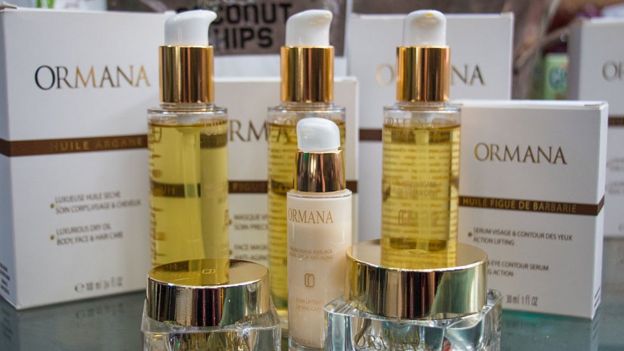Argan oil: "liquid gold" that international companies flock to and make Moroccan women for a small fee
The demand for Moroccan argan oil has increased around the world; It has a wide variety of uses, including food preparation and cosmetics.
Concerns remain about the wages paid to girls and women by the workforce, and the conditions under which they produce oil.
I saw a group of women, each of whom used two stones, one large and one small, to crush the fruits of the argan trees until they obtained the seeds inside a solid shell inside.
The women sit on cushions laid on the floor, along with piles of fruit.
"I want a better job, at a better pay. But there is no other chance, this is my only choice," says one worker, Samira Shari, who is 37.
We are in a rural area in Morocco, about 25 km from the port of Essaouira, and halfway to the Atlantic coast. The weather is warm and sunny, and green corner trees are scattered here and there in this arid region.
The women work for a company called Morgana, which is one of 300 small companies, most of which are cooperatives, and produce argan oil by extracting it from the seeds. These trees, 10 meters long, are located throughout Morocco.
This oil is known as the "liquid gold of the country" and has helped increase its sale globally. Studies have shown its health benefits. Global production, which comes mostly from Morocco, is expected to reach 19,623 tons, or the equivalent of one billion and 79 million US dollars, by 2022, after it was 4,836 tons in 2014.
Argan oil is traditionally used in Morocco as a foodstuff, dipping bread in it, sprinkling couscous and salad, or as a medicinal substance. But the global demand for it has increased by the cosmetic industries. It is used as face cream, and has been added to lip balms, shampoos, other moisturizers, and soaps.
Most of the women who collect the seeds belong to the Berber groups, and this is the situation in Morgana, where the chief of staff, Amina Bona, says that the company employs large skilled workers.
"Berber women are good at extracting oil. It is a skill that Berbers inherit. Other than that, we have all kinds of women, young and old, married and divorced."
The company allows 80 women in it, at the time they want. Although many of them work from early morning until evening, they earn less than $ 221 a month, says Bona, and this is less than the minimum wage recommended in Morocco.
"But this is better than keeping them in their homes. In the past, oil was produced in the homes. Husbands used to sell it in the markets, and kept the money. Now women do not need their husbands’ money, as they have their own money. The situation is now a win-win situation, "she says.
The workers enjoy some health insurance and pensions, but Samira Shari wants to increase the wages. She says she has to work long hours to be able to provide medicine for her daughter, because she is divorced. If she receives more wages, she says, she will be able to spend more time with her daughter.
As the industry became profitable, interest in wages for women increased and became a hot issue. Among the leading advocates of higher wages is Zubaida Shrouf, Professor of Chemistry at the University of Mohamed V in Rabat.
Shroff, who helped boost sales of Argan oil after publishing studies of his health benefits, says wages sometimes fall as low as $ 50 a month.
She adds that some companies prefer to pay for some taxis and bus drivers to bring tourists to their facilities to buy oil directly from them, provided that they pay reasonable wages to the workers.
Shrouf says that work has now begun near the city of Agadir, about 175 km south of Essaouira, and is to expand to the north. She adds, "Women are not happy, and they need help to continue the struggle."
Shroff expressed her concern about the increase in the production of argan oil production, as oil is being extracted automatically at huge rates, which leads to lower prices.
The cost of production in this way is about $ 22 per liter, and this is almost half the cost of oil produced in what is known as small cooperatives.
But she expressed her happiness that the huge cosmetic company L'Oréal, has pledged to buy all the argan oil you need from small cooperatives, signed to maintain fair trade principles.
At Marjana, she met Khadija, 55, who was less optimistic about her oil seed extraction than her colleague Samira Shari. She began working for the company in 2008, after working as a cleaner elsewhere.
"Argan oil is a local product, and I really want to work on it," says Khadija. "But now I am a cleaner, and due to my work I do not enjoy any health insurance or a pension. But my son can now go to university, and I can buy what I need."
For some free trial periods, ask them here after completing the answer
For questions about a robot and also getting a gift of a bank card with a value of one thousand dollars open all year long, subscribe here





تعليقات: 0
إرسال تعليق